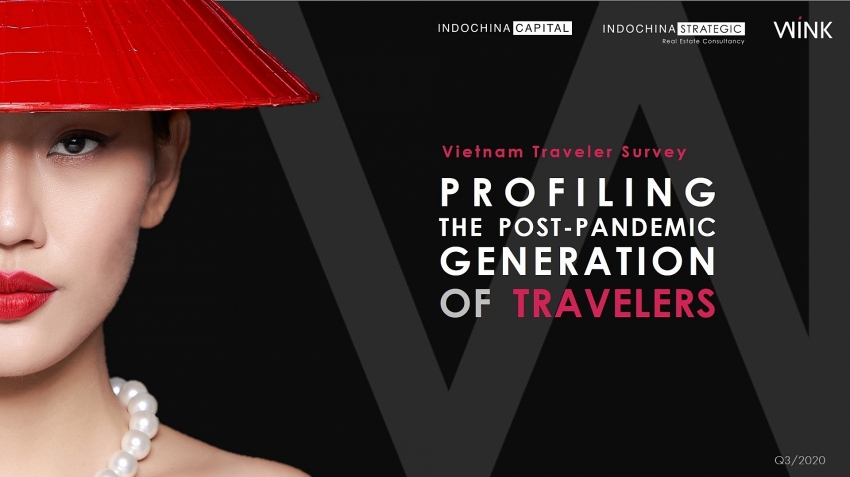Indochina Capital and Wínk Hotels assess preferences of Vietnamese travellers
 |
| The fresh survey of Indochina Capital and Wínk Hotels reflects the travel habits and preferences of Vietnamese travellers during COVID times |
Conducted in mid-August 2020, the survey totalled 700 participants from first-tier cities, 90 per cent of which were Vietnamese and 10 per cent were foreigners. Insights gained from the responses were drawn to aid hoteliers and hospitality players grasp the new domestic tourism landscape, as the Ministry of Culture, Sports and Tourism pushes forward domestic tourism stimulus programmes and travel and hospitality companies gear up to launch new campaigns.
A silver lining amid the COVID-19 pandemic is the fact that Vietnamese travellers are as keen to travel as they were pre-pandemic – domestic travel grew from 57 million to 90 million from 2015-2019 and previous surveys have shown that Vietnamese customers are increasingly willing to spend more on holidays.
Indochina Capital and Wínk Hotels’ latest survey reinforces this trend as 99.7 per cent of respondents confirmed they travel at least once a year domestically for leisure purposes, while 83.7 per cent stated they travel at least twice a year.
| Though the survey was undertaken just after the second surge of infections in Vietnam, 68 per cent of respondents stated they intend to resume travelling by the fourth quarter this year. |
Though the survey was undertaken just after the second surge of infections in Vietnam, 68 per cent of respondents stated they intend to resume travelling by the fourth quarter this year, which confirms their eagerness to travel (or a certain degree of “cabin fever”) and confidence in the government’s handling of the pandemic.
According to Michael Piro, COO, Indochina Capital and CEO, Wínk Hotels, tourism and real estate are bound to be major building blocks for economic recovery. As Vietnamese travelers are already planning their next domestic trip, the economy is going to rely on consumers to return to their pre-COVID spending levels, which should be enabled by travel.
“With borders slowly and carefully being reopened, the domestic market will be the main driver for economic recovery. The impressive handling of COVID-19 has pushed Vietnam’s position forward as a promising investment destination, and with this survey we want to highlight elements which will help hoteliers and tourism-focused real estate owners enhance their financial returns,” Piro added.
The survey highlights the dominance of online channels for brand touchpoint and accommodation booking: 64 per cent of travellers will use online travel agencies to conduct their bookings and 91 per cent rely on digital advertisements for their hotel browsing.
The survey also underlines Vietnamese travellers’ preference for short leisure trips of less than four nights, with the majority of business trips lasting no more than two nights. On pricing strategies, just a quarter of respondents is willing to spend above VND2 million ($87) per night on personal trips, and they spend even less on business trips.
Other information in the survey include who Vietnamese travelers travel with (group travel, family travel, solo travelers, and more), their preferred mode of transport, attractive features for a hotel/accommodation advertisement, decision-making factors when choosing an accommodation, and assessing the quality of a hotel stay.
What the stars mean:
★ Poor ★ ★ Promising ★★★ Good ★★★★ Very good ★★★★★ Exceptional
Related Contents
Latest News
More News
- Wink Hotels to revolutionise the hotel industry (June 30, 2022 | 10:00)
- Wink Hotels revolutionises new breed of hotels for travellers (June 27, 2022 | 09:49)
- Getting back in the travel groove for 2022 (January 04, 2022 | 10:27)
- Bank and real estate giants team up (April 26, 2021 | 09:51)
- Indochina Kajima commences Phu Yen luxury tourism project (April 05, 2021 | 13:04)
- Foreign investment continues to flow into hospitality market (March 15, 2021 | 11:17)
- Satellite towns with purpose (January 19, 2021 | 11:00)
- Wink Hotels’ first hotel opening in Ho Chi Minh City (January 19, 2021 | 10:59)
- Seizmic shifts in Vietnamese real estate market (November 26, 2020 | 12:34)
- Wealth creation amid the coronavirus conundrum (November 09, 2020 | 08:20)

 Tag:
Tag:


























 Mobile Version
Mobile Version